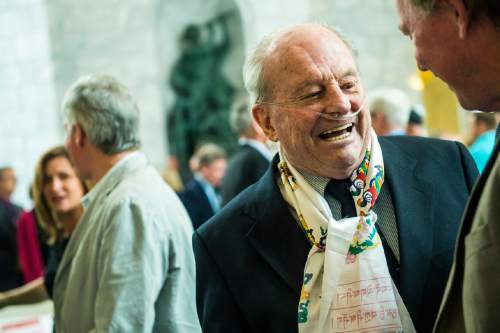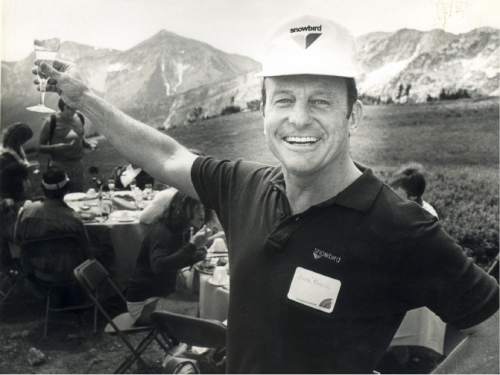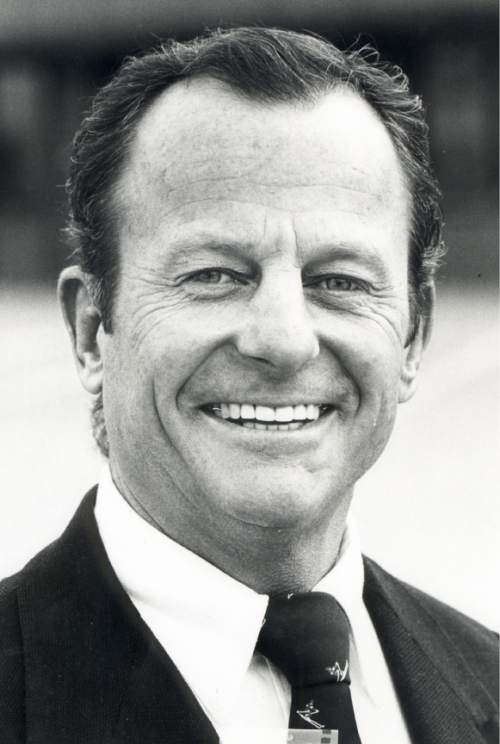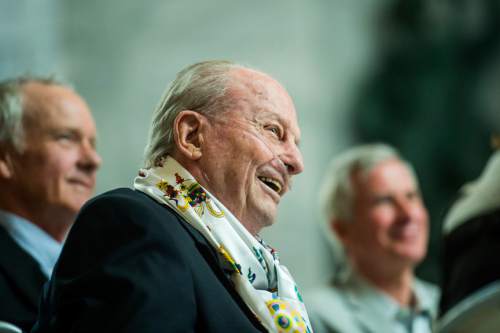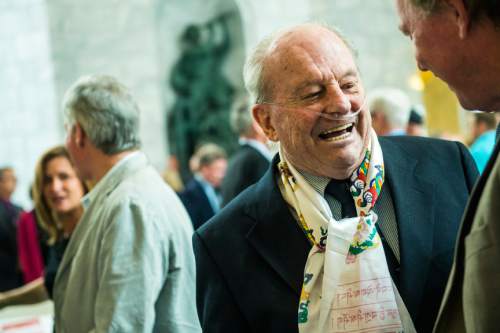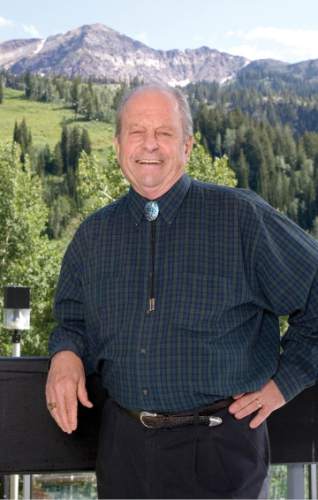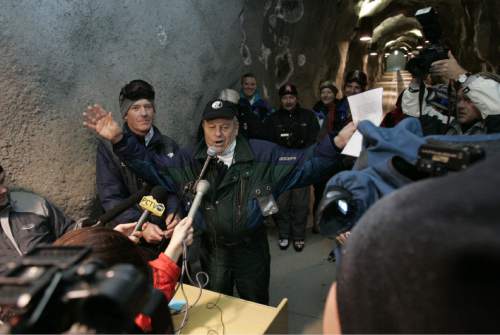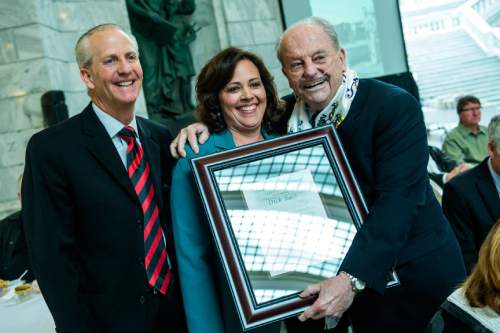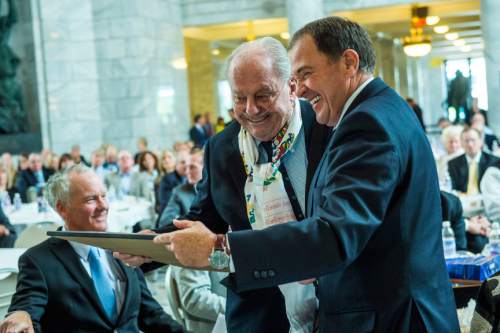This is an archived article that was published on sltrib.com in 2015, and information in the article may be outdated. It is provided only for personal research purposes and may not be reprinted.
Dick Bass could be as windy as the towering mountains he climbed.
That was part of the reason people loved him so. He might have been rich, might have been a ski-industry pioneer (helping found Snowbird was just one of his ventures) and might have been the first person to reach the summit of the tallest mountain on each continent — all noteworthy accomplishments in their own rights.
But he was also a character — and counted people worldwide among his friends when he died Sunday in Texas of pulmonary fibrosis at age 85.
"When I'd see him, he didn't even have to open his mouth and I'd start smiling," said Deer Valley President and CEO Bob Wheaton.
Added ski historian Alan Engen: "I had the highest admiration for Dick Bass. He was fun to be with and, of course, he never stopped talking."
Bass was a transformative figure in Utah skiing history, elevating the state's industry on the national and international scene when he and Ted Johnson established Snowbird Ski & Summer Resort in 1971, giving it an iconic image right from the start with the Tram to Hidden Peak.
Snowbird's creation also gave rise to Save Our Canyons and the conservation community's efforts to protect the tops and backcountry of the central Wasatch Mountains from development.
"We always got along well," said conservationist Alexis Kelner of his relationship with Bass, which included a trip to Switzerland to see structures built on mountaintops there. "I always respected him and I think he respected me, too, although we had totally different visions of what the Wasatch should be. … He did [conservationists] a great service by energizing all of us who had a little different viewpoint. Snowbird was responsible for helping us marshal our forces and be more effective."
Bass fell in love with Little Cottonwood Canyon when he hiked the area with Johnson, seeing it as a place to increase "human understanding through the enhancement of body, mind and spirit." He spearheaded its development as a modern counterpart to rustic next-door-neighbor Alta, creating a one-two punch as appealing as any mountain destination anywhere.
"Alta and Snowbird couldn't be more different, but they complement each other so well, the yin and the yang, and they share the good stuff," said Ski Utah President Nathan Rafferty. "Dick saw that. He was such a visionary and saw some of his wild ideas come true because he went out and did it. He was a unique and inspiring individual. When I was with him, I always had the feeling I was in the presence of a living legend."
Bass first invested in Snowbird after having played a role in the creation of Vail and Beaver Creek in Colorado. He also had interests in Aspen and Alta, but at the time, putting money into ski resorts was risky business.
"It took courage because it was a dicey financial venture to undertake back in the '70s," said Bob Bonar, Snowbird's president and a resort employee since its start. "The industry wasn't as successful as most mountain resorts are today. The saying was that if you want to make a small fortune in the ski industry, start out with a big fortune."
But Bass was a good marketer and, playing up the image of the Tram, "he really put Utah on the international market," Bonar said. "Everybody locally already knew about the greatest snow on Earth, but Snowbird's marketing campaign helped jump-start the Utah skiing product. The branding that came with that gave the Utah market more traction."
Born in Tulsa, Okla. on Dec. 21, 1929, Bass graduated from Yale and worked in his family's oil, gas and ranching businesses before joining with his brother, Harry, to get Vail off the ground in the 1960s. After his business fortunes were secure, Bass became focused on mountaineering and in 1985, became the first person to reach the seven continental high points when he conquered Mount Everest with guide David Breshears, a frequent presence at Snowbird.
Whatever he did, Bass did it without restraint, peppering his conversation with "Bassisms" and laughing at his own jokes as well as those of others. When Snowbird opened its tunnel between Peruvian Gulch and Mineral Basin, for instance, Bass guffawed heartily upon hearing the tunnel's irreverent nickname was the "Basshole."
He showed that same exuberance last June 17, which Gov. Gary Herbert and several local governments teamed up to declare "Dick Bass Day." Even though he was tethered to an oxygen tank and had a weak voice, Bass sang a ditty from the musical "H.M.S. Pinafore," explained the science of lake-effect storms and warded off several slapstick efforts to get him off the stage during a ceremony at the state Capitol.
The honor came a couple of months after Bass sold his majority interest in Snowbird to Ian Cumming of Park City-based PowdrCorp.
It was a difficult thing for him to do, but the disease left him unable to breathe at Snowbird's 8,100-foot base elevation and, Bonar noted, he felt comfortable with Cumming's devotion to Snowbird. "I know that Dick feels like Snowbird has been left in good hands, with someone who cares about it and Little Cottonwood Canyon."
Services will be held Friday at St. Michael and All Angels Episcopal Church in Dallas. Bass leaves behind his widow, Alice; four children, five stepchildren and 24 grandchildren and stepgrandchildren.


